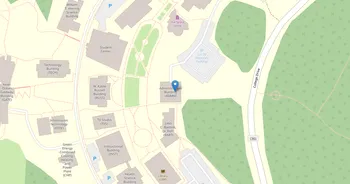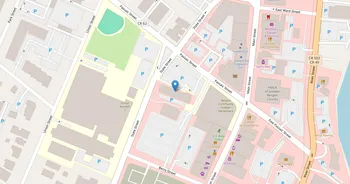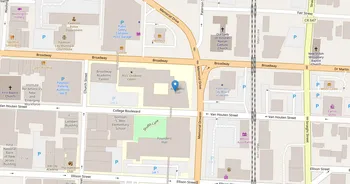New Jersey Institute of Technology (NJIT) : Overview, Courses, Scholarships & Rankings
About New Jersey Institute of Technology
Set in a vibrant corner of Newark, New Jersey Institute of Technology is known for strength in engineering, computing, architecture and design, and applied sciences. Learning leans on problem solving, with hands-on labs and studios, maker spaces, and project teams that feel like the workplace. Students tap a solid library, tutoring and advising, career coaching, and health and counseling, plus on-campus housing and dining.
Campus life is active and practical, with cultural orgs, build-and-code clubs, service projects, intramurals, and a modern rec center. The culture skews collaborative and down to earth. Career prep runs through internships and co-ops, along with faculty ties to industry. Newark's arts venues and restaurants add opportunity, and a quick train ride opens doors in Manhattan. Traditions include Highlander pride and public project showcases. Notable alumni include engineer and business leader Albert Dorman.
Key Institutional Details
Contact & Profile
Academic & Institutional
Academic Programs & Fields of Study
New Jersey Institute of Technology (NJIT) offers 64 degree programs across 19 major academic fields, graduating approximately 3,305 students annually. The most popular fields by graduate volume are Computer & IT (6 programs, 1,130 graduates), Engineering (16 programs, 940 graduates), Business (5 programs, 317 graduates), Interdisciplinary (6 programs, 251 graduates) and Eng. Technologies (6 programs, 247 graduates). Explore program details, award levels, and graduate demographics below.
Computer & IT (6 programs, 1,130 graduates)
Computer Science, Information Technology and Cybersecurity
| Program Name | Graduates | Gender Distribution | Award Levels | CIP Code |
|---|---|---|---|---|
| Computer and Information Sciences | 677 |
|
Bachelor's
Postbac Cert.
Master's
Doctorate (R)
|
11.0101 |
| Information Technology | 218 |
|
Bachelor's
Postbac Cert.
Master's
|
11.0103 |
| Information Science | 180 |
|
Bachelor's
Master's
Doctorate (R)
|
11.0401 |
| Information Systems Security and Auditing | 50 |
|
Postbac Cert.
Master's
|
11.1003 |
| Artificial Intelligence | 3 |
|
Postbac Cert.
Master's
|
11.0102 |
| Computer Science | 2 |
|
Bachelor's
Master's
|
11.0701 |
Engineering (16 programs, 940 graduates)
Engineering Sciences and Applied Technology Solutions
| Program Name | Graduates | Gender Distribution | Award Levels | CIP Code |
|---|---|---|---|---|
| Civil Engineering | 259 |
|
Bachelor's
Postbac Cert.
Master's
Doctorate (R)
|
14.0801 |
| Mechanical Engineering | 218 |
|
Bachelor's
Master's
Doctorate (R)
|
14.1901 |
| Biomedical Engineering | 98 |
|
Bachelor's
Master's
Doctorate (R)
|
14.0501 |
| Electrical and Electronics Engineering | 90 |
|
Bachelor's
Postbac Cert.
Master's
Doctorate (R)
|
14.1001 |
| Computer Engineering | 81 |
|
Bachelor's
Master's
Doctorate (R)
|
14.0901 |
| Chemical Engineering | 79 |
|
Bachelor's
Postbac Cert.
Master's
Doctorate (R)
|
14.0701 |
| Industrial Engineering | 63 |
|
Bachelor's
Postbac Cert.
Master's
|
14.3501 |
| Software Engineering | 12 |
|
Master's
|
14.0903 |
| Transportation Engineering | 9 |
|
Master's
Doctorate (R)
|
14.0804 |
| Environmental Health Engineering | 9 |
|
Master's
Doctorate (R)
|
14.1401 |
| Systems Engineering | 8 |
|
Master's
|
14.2701 |
| Materials Engineering | 5 |
|
Master's
|
14.1801 |
| Manufacturing Engineering | 4 |
|
Master's
|
14.3601 |
| Engineering | 3 |
|
Postbac Cert.
|
14.9999 |
| Geotechnical and Geoenvironmental Engineering | 1 |
|
Postbac Cert.
|
14.0802 |
| Engineering Science | 1 |
|
Master's
|
14.1301 |
Business (5 programs, 317 graduates)
Business Administration, Marketing and Entrepreneurship
| Program Name | Graduates | Gender Distribution | Award Levels | CIP Code |
|---|---|---|---|---|
| Business Administration and Management | 119 |
|
Bachelor's
Postbac Cert.
Master's
|
52.0201 |
| Management Science | 94 |
|
Postbac Cert.
Master's
Doctorate (R)
|
52.1301 |
| Management Sciences and Quantitative Methods | 94 |
|
Master's
|
52.1399 |
| Finance, General | 6 |
|
Postbac Cert.
|
52.0801 |
| Business Administration and Management | 4 |
|
Postbac Cert.
|
52.0299 |
Interdisciplinary (6 programs, 251 graduates)
Cross-Disciplinary Studies and Integrated Research Programs
| Program Name | Graduates | Gender Distribution | Award Levels | CIP Code |
|---|---|---|---|---|
| Data Science | 209 |
|
Bachelor's
Master's
|
30.7001 |
| Financial Analytics | 19 |
|
Bachelor's
|
30.7104 |
| Behavioral Sciences | 12 |
|
Bachelor's
|
30.1701 |
| Science, Technology, and Society | 8 |
|
Bachelor's
|
30.1501 |
| Sustainability Studies | 2 |
|
Postbac Cert.
|
30.3301 |
| Data Visualization | 1 |
|
Postbac Cert.
|
30.7103 |
Eng. Technologies (6 programs, 247 graduates)
Applied Engineering Technologies and Technical Support
| Program Name | Graduates | Gender Distribution | Award Levels | CIP Code |
|---|---|---|---|---|
| Industrial Engineering Management | 105 |
|
Master's
|
15.1501 |
| Mechanical Engineering Technology | 65 |
|
Bachelor's
|
15.0805 |
| Electrical and Electronic Engineering Technology | 39 |
|
Bachelor's
|
15.0303 |
| Construction Engineering Technology | 23 |
|
Bachelor's
|
15.1001 |
| Engineering Technologies and Technicians | 10 |
|
Bachelor's
|
15.1199 |
| Surveying Technology | 5 |
|
Bachelor's
|
15.1102 |
Architecture (2 programs, 144 graduates)
Architectural Design and Construction Planning Services
| Program Name | Graduates | Gender Distribution | Award Levels | CIP Code |
|---|---|---|---|---|
| Architectural and Building Sciences | 139 |
|
Bachelor's
Master's
|
04.0902 |
| Urban and Regional Planning | 5 |
|
Master's
|
04.0301 |
Biological Sciences (6 programs, 87 graduates)
Life Sciences, Biotechnology and Biomedical Research
| Program Name | Graduates | Gender Distribution | Award Levels | CIP Code |
|---|---|---|---|---|
| Biology and Biological Sciences | 65 |
|
Bachelor's
Master's
Doctorate (R)
|
26.0101 |
| Biochemistry | 12 |
|
Bachelor's
|
26.0202 |
| Biomedical Sciences | 4 |
|
Master's
|
26.0102 |
| Bioinformatics | 4 |
|
Master's
|
26.1103 |
| Biostatistics | 1 |
|
Master's
|
26.1102 |
| Biological and Biomedical Sciences | 1 |
|
Postbac Cert.
|
26.9999 |
Mathematics (3 programs, 37 graduates)
Mathematical Sciences, Statistics and Computational Analysis
| Program Name | Graduates | Gender Distribution | Award Levels | CIP Code |
|---|---|---|---|---|
| Mathematics | 29 |
|
Bachelor's
Doctorate (R)
|
27.0101 |
| Statistics | 5 |
|
Postbac Cert.
Master's
|
27.0501 |
| Applied Mathematics | 3 |
|
Master's
|
27.0301 |
Physical Sciences (2 programs, 34 graduates)
Chemistry, Physics and Earth Sciences Research
Arts (3 programs, 26 graduates)
Fine Arts, Design Studies and Creative Performance
| Program Name | Graduates | Gender Distribution | Award Levels | CIP Code |
|---|---|---|---|---|
| Industrial and Product Design | 12 |
|
Bachelor's
|
50.0404 |
| Interior Design | 12 |
|
Bachelor's
|
50.0408 |
| Theatre Design and Technology | 2 |
|
Bachelor's
|
50.0502 |
Admission Requirements & Test Scores
Comprehensive overview of admission criteria, standardized test score ranges, and application requirements for prospective students at New Jersey Institute of Technology (NJIT).
Application Requirements
Data based on IPEDS for 2022-2023 academic year. Test score ranges represent the middle 50% of admitted students (25th-75th percentile). Requirements may vary by program.
Tuition, Fees & Estimated Costs
Overview of tuition rates, housing, and other annual education expenses for undergraduate and graduate students
Financial Aid & Student Support
Summary of scholarships, grants, student loans, and financial aid statistics for undergraduate students
Student Success Metrics
Graduation rates and post-graduation earnings to help assess student outcomes and long-term value of education.
Loan Burden & Repayment Outcomes
Breakdown of loan repayment rates and student debt levels by income and dependency status.
Frequently Asked Questions
Find answers to the most common questions about New Jersey Institute of Technology (NJIT)
How much does it cost to attend New Jersey Institute of Technology (NJIT)?
The annual tuition at New Jersey Institute of Technology (NJIT) is $19,022 for in-state students and $35,934 for out-of-state students. When including room and board, books, and other expenses, the total estimated cost is approximately $41,352 for in-state students and $58,264 for out-of-state students. Additional costs include room and board $15,000 (on) / $17,200 (off) and books and supplies $2,750.
Data based on IPEDS program completions for 2022-2023 academic year. Tuition and cost estimates are approximate and may not include all fees, personal expenses, or transportation costs.
What academic programs and degree levels does New Jersey Institute of Technology offer?
New Jersey Institute of Technology (NJIT) offers 64 academic programs across 19 major fields of study, with available degree levels: Bachelor's, Postbac Cert., Master's, Doctorate (Research).
Most popular program areas include:
- Computer Science, Information Technology and Cybersecurity (6 programs)
- Engineering Sciences and Applied Technology Solutions (16 programs)
- Business Administration, Marketing and Entrepreneurship (5 programs)
- Cross-Disciplinary Studies and Integrated Research Programs (6 programs)
- Applied Engineering Technologies and Technical Support (6 programs)
Data based on IPEDS program completions for 2023-2024 academic year. Numbers reflect programs where students graduated, not all offered programs.
What is the acceptance rate for New Jersey Institute of Technology?
New Jersey Institute of Technology (NJIT) has an 66.9% acceptance rate and a 18.8% yield rate, making it selective.
Admission statistics breakdown:
- Total applicants: 13,993
- Students admitted: 9,362
- Students enrolled: 1,762
Data based on IPEDS for 2022-2023 academic year. Admission statistics may vary by program and application cycle.
What financial aid and scholarships are available at New Jersey Institute of Technology?
New Jersey Institute of Technology (NJIT) provides financial aid to 16% of first-time, full-time students, with average grants of $17,447 and average loans of $7,916.
Average financial aid amounts by type:
- Pell grants: $5,779
- State/Local grants: $10,029
- Institutional grants: $11,462
- Federal loans: $5,215
The university supports 1,312 students with grants and 468 students with loans annually.
Data based on IPEDS for 2022-2023 academic year. Financial aid amounts and percentages may vary by program, enrollment status, and individual circumstances.
What is the average salary for New Jersey Institute of Technology graduates?
New Jersey Institute of Technology (NJIT) graduates earn a median salary of $69,591 after 6 years and $84,276 after 10 years.
The salary range 10 years after graduation spans from $55,991 (25th percentile) to $113,061 (75th percentile).
Data based on IPEDS for 2022-2023 academic year. Salary data reflects graduates who received federal financial aid (approximately 60% of all graduates). Actual earnings may vary significantly based on program, location, and individual circumstances.
Related Universities




Found something useful? Help others discover it too! Share with friends, on social media, or save for later - every share helps someone find the information they need.